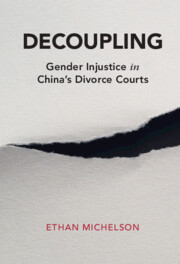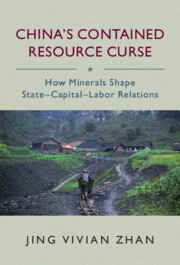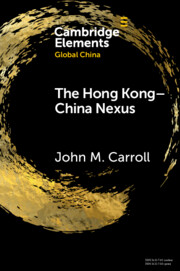13084 results in East Asian government, politics and policy
CHAPTER ONE - Sisyphus Goes to Divorce Court
-
- Book:
- Decoupling
- Published online:
- 24 March 2022
- Print publication:
- 31 March 2022, pp 1-34
-
- Chapter
-
- You have access
- Open access
- HTML
- Export citation
References
-
- Book:
- China's Contained Resource Curse
- Published online:
- 24 March 2022
- Print publication:
- 31 March 2022, pp 205-218
-
- Chapter
- Export citation
CHAPTER FIVE - “Many Cases, Few Judges” and the Vanishing Three-Judge Trial
-
- Book:
- Decoupling
- Published online:
- 24 March 2022
- Print publication:
- 31 March 2022, pp 154-186
-
- Chapter
-
- You have access
- Open access
- HTML
- Export citation
CHAPTER NINE - Fight or Flight
-
- Book:
- Decoupling
- Published online:
- 24 March 2022
- Print publication:
- 31 March 2022, pp 331-380
-
- Chapter
-
- You have access
- Open access
- HTML
- Export citation
Preface and Acknowledgments
-
- Book:
- Decoupling
- Published online:
- 24 March 2022
- Print publication:
- 31 March 2022, pp xiii-xviii
-
- Chapter
-
- You have access
- Open access
- HTML
- Export citation
CHAPTER TWELVE - Conclusions
-
- Book:
- Decoupling
- Published online:
- 24 March 2022
- Print publication:
- 31 March 2022, pp 452-475
-
- Chapter
-
- You have access
- Open access
- HTML
- Export citation
CHAPTER ELEVEN - Quantitative Patterns in Child Custody Determinations
-
- Book:
- Decoupling
- Published online:
- 24 March 2022
- Print publication:
- 31 March 2022, pp 412-451
-
- Chapter
-
- You have access
- Open access
- HTML
- Export citation
From Court Fools to Stage Puppets: Country Bumpkins in the Skits on CCTV's Spring Festival Gala, 1983–2022
- Part of
-
- Journal:
- The China Quarterly / Volume 250 / June 2022
- Published online by Cambridge University Press:
- 31 March 2022, pp. 552-571
- Print publication:
- June 2022
-
- Article
-
- You have access
- Open access
- HTML
- Export citation
CHAPTER THREE - The Divorce Twofer
-
- Book:
- Decoupling
- Published online:
- 24 March 2022
- Print publication:
- 31 March 2022, pp 65-102
-
- Chapter
-
- You have access
- Open access
- HTML
- Export citation
3 - Resource Extraction and Victimization of Labor
-
- Book:
- China's Contained Resource Curse
- Published online:
- 24 March 2022
- Print publication:
- 31 March 2022, pp 76-113
-
- Chapter
- Export citation
CHAPTER FOUR - Studying Judicial Decision-Making
-
- Book:
- Decoupling
- Published online:
- 24 March 2022
- Print publication:
- 31 March 2022, pp 103-153
-
- Chapter
-
- You have access
- Open access
- HTML
- Export citation
CHAPTER TWO - The Right to Decouple
-
- Book:
- Decoupling
- Published online:
- 24 March 2022
- Print publication:
- 31 March 2022, pp 35-64
-
- Chapter
-
- You have access
- Open access
- HTML
- Export citation
CHAPTER SEVEN - How Judges Gaslight Domestic Violence Victims in Divorce Trials
-
- Book:
- Decoupling
- Published online:
- 24 March 2022
- Print publication:
- 31 March 2022, pp 237-269
-
- Chapter
-
- You have access
- Open access
- HTML
- Export citation
Abbreviations
-
- Book:
- China's Contained Resource Curse
- Published online:
- 24 March 2022
- Print publication:
- 31 March 2022, pp xiii-xiv
-
- Chapter
- Export citation
Tables
-
- Book:
- Decoupling
- Published online:
- 24 March 2022
- Print publication:
- 31 March 2022, pp x-xii
-
- Chapter
-
- You have access
- Open access
- HTML
- Export citation
Total Mobilization from Below: Hong Kong's Freedom Summer
-
- Journal:
- The China Quarterly / Volume 251 / September 2022
- Published online by Cambridge University Press:
- 28 March 2022, pp. 629-659
- Print publication:
- September 2022
-
- Article
-
- You have access
- Open access
- HTML
- Export citation

Decoupling
- Gender Injustice in China's Divorce Courts
-
- Published online:
- 24 March 2022
- Print publication:
- 31 March 2022
-
- Book
-
- You have access
- Open access
- Export citation

China's Contained Resource Curse
- How Minerals Shape State-Capital-Labor Relations
-
- Published online:
- 24 March 2022
- Print publication:
- 31 March 2022
Of Judge Quota and Judicial Autonomy: An Enduring Professionalization Project in China
-
- Journal:
- The China Quarterly / Volume 251 / September 2022
- Published online by Cambridge University Press:
- 24 March 2022, pp. 866-887
- Print publication:
- September 2022
-
- Article
- Export citation

The Hong Kong-China Nexus
- A Brief History
-
- Published online:
- 23 March 2022
- Print publication:
- 05 May 2022
-
- Element
- Export citation

